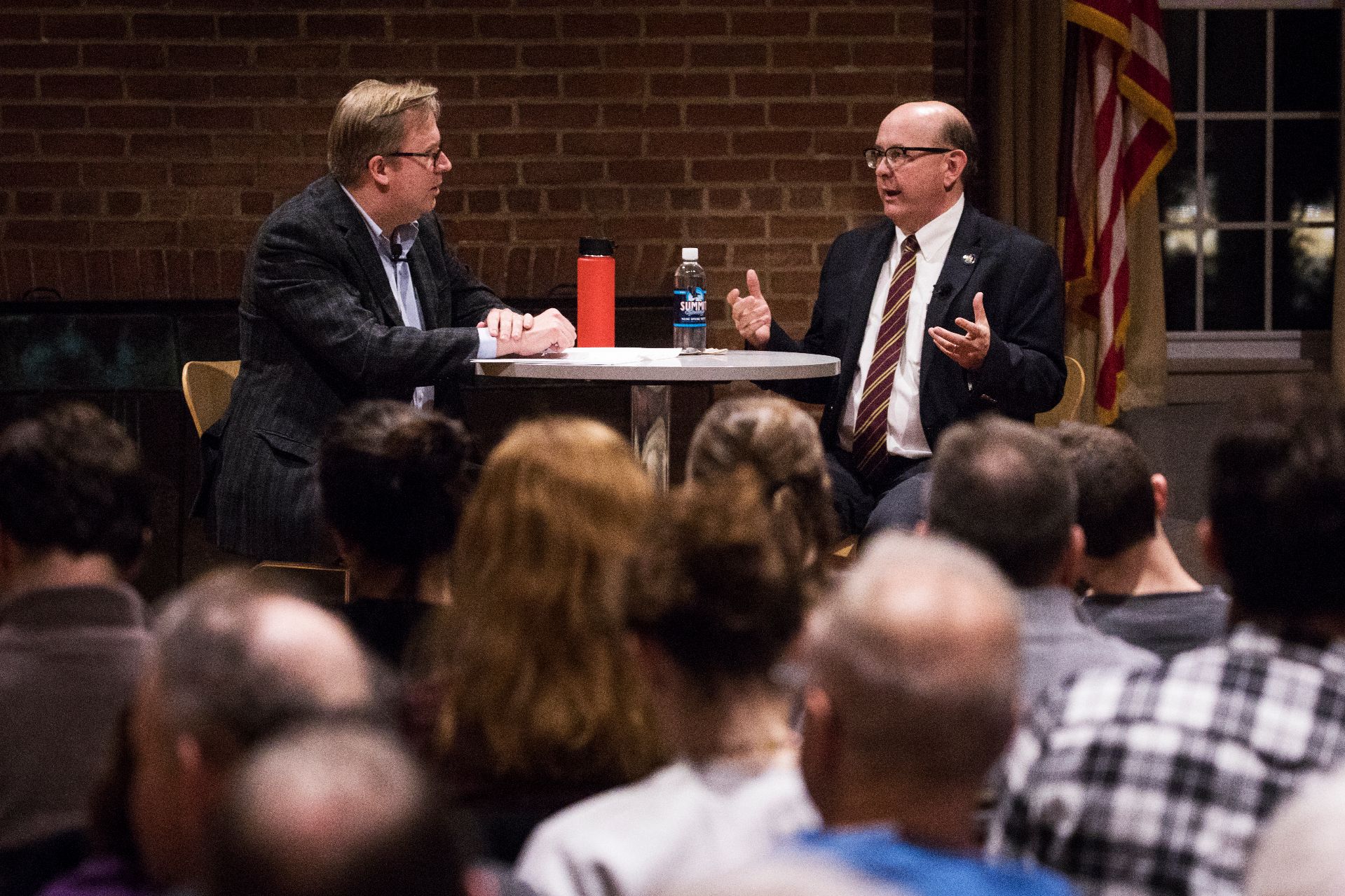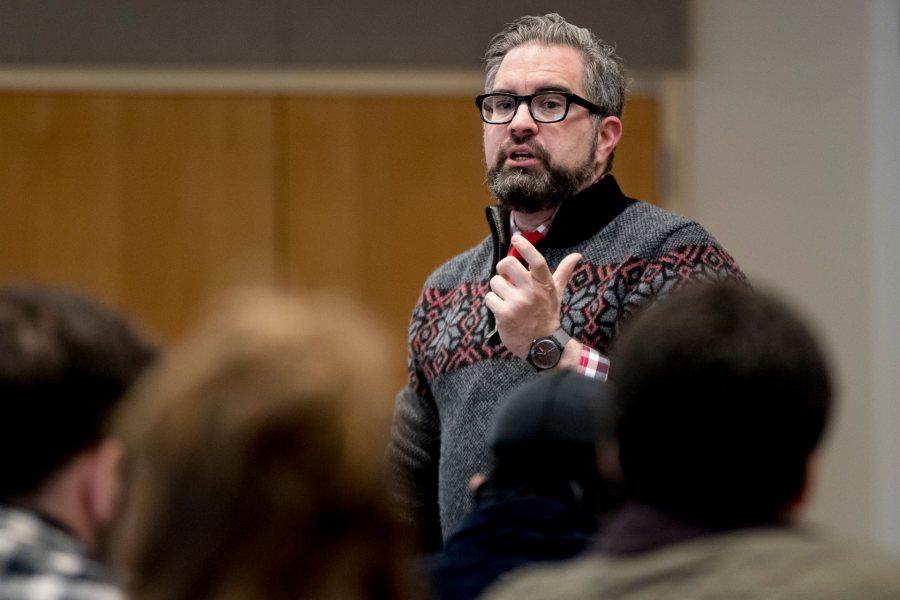
On Friday the 13th, we offer 13 post-election insights from five members of the politics department about what’s happening now and what challenges facing Joe Biden (and there are boatloads) if and when he’s able to assume the U.S. presidency.
Indeed, President Trump’s ongoing refusal to concede or even acknowledge a potential transition threatens “even a most minimalist definition of democracy,” says Professor of Politics Stephen Engel.
As president, Biden may find it difficult to effect even basic policy changes, like reversing Trump’s restrictive approach to immigration, adds Clarisa Pérez-Armendáriz.
Joining Engel and Pérez-Armendáriz for a second round of post-election offerings were politics department colleagues John Baughman, Alyssa Maraj Grahame, and Jim Richter.
1. Lawsuits have failed and will continue to fail
Lawsuits challenging the results of the presidential election “have been failing and will continue to fail,” say Baughman, an associate professor whose focus is on U.S. politics, including Congress, elections, political parties, and political participation.
2. The challenge to the election is based on ‘a grift and a con’
By challenging the election, Baughman suggests that Trump and his followers are engaged in “a grift and a con.”
The grift: The Trump administration is using their fight against the results to fundraise for his campaign and the Republican National Committee.
The con is of Trump’s base, “turning their disappointment into anger that can be used to mobilize for the Senate special elections in Georgia and to mobilize toward the next rounds of federal elections in 2022 and 2024.”

3. Challenging the results of elections is a ‘dangerous game’
Anyone who played schoolyard games as a kid knows that once the rules aren’t followed, the game disintegrates. And that’s what can happen if Trump continues his shenanigans, says Baughman.
Challenging the election and refusing to concede is a “dangerous game, not in terms of the current election but how it threatens confidence in our democratic and electoral institutions. This is where the lasting harm is likely to come — erosion in the electoral processes, fueling dismissal of President Biden as the rightfully elected president. And once we lose that kind of faith in political institutions it’s going to take a lot of work to get it back.”
Further, calling into question election results also threatens to “dismiss political institutions broadly as a legitimate venue for resolving disputes. And that confidence is not something that comes back very easily, either, because it becomes very easy to blame the institution or the process for any disappointing outcome.”
And if confidence in electoral institutions erodes, “that would also have downstream effects for bipartisan efforts within Congress, if members of either party do not think that they can legitimately pursue their plans with the other party.”
4. Trump’s restrictive approach to immigration will be hard to undo.
In recent history, presidential administrations typically approached immigration from the perspective of reform, says Clarisa Pérez-Armendáriz, an associate professor whose focus includes Latinx politics, Latin American politics, and immigration politics and policy.
“Reform was the starting line, the goal being to create a path toward citizenship for the undocumented,” she says.

However, the Trump administration’s approach has been to “ramp up immigration restrictions across the board, including restrictions on refugee resettlement; asylum seekers; immigrant and nonimmigrant visas; citizenship applications; and the path toward citizenship for undocumented citizens.”
For example, on average in the decade before Trump, we saw about 98,000 refugees resettled per year. Under the Trump administration, the average has been 15,000. “And we’ve seen a 50 percent drop in legal migration between 2016 and 2019 due to policies like the Muslim ban, major new restrictions on visas for high-skilled workers, and restrictions on students.”
While Biden can take executive action on some immigration issues, like stopping the funding for the Mexico–U.S. wall, stopping family separation, and restoring funding for DACA processing, “the Biden administration will have its hands full just getting us to where we were before Trump.”
Pérez-Armendáriz notes that some say the “single most important thing Biden can do is to appoint someone to the Department of Homeland Security who restores the value and belief that we’re a country of immigrants.
“But that actually might be harder than people expect. It’s very sad for me to even hear myself say that this is what we’re aiming for.”

5. Turning the “Abolish ICE” discourse into policy will be a challenge for the Democrats
At some point, the discourse around abolishing the U.S. Immigration and Customs Enforcement will run headlong into centrist, across-the-aisle policy efforts.
“Biden can take steps to make ICE more accountable, but there will be people for whom even the prospect of another Trump, Donald Trump Jr., in the next election, won’t make them willing to take a middle ground and give up their goal to abolish ICE,” Pérez-Armendáriz says.
6. We can agree (can’t we?) on one thing: Trump’s foreign policy was a….
“I’m in one of those rare positions where I can say something like, ‘Trump’s foreign policy is a disaster,’ and it will not be a partisan issue,” says Richter, a professor who teaches international relations, environmental politics, public memory, and the politics of Eastern Europe and Russia.

Richter points to the boatload of elected and appointed Republican leaders with foreign-policy cred who have gone public with major criticisms of the president’s foreign policy. “So let me say it: ‘Trump’s foreign policy was a disaster,’” says Richter.
Since the Great Depression, the U.S. approach to foreign policy has been to help strengthen overseas industrial economies to the extent it could, counting on them as trading partners to safeguard the U.S. economy against another Depression and threats to its democracy.
“What the Trump administration has done is to decrease other countries’ trust in the U.S. to do the right thing under any circumstances.”
“People disagree on how wonderful our approach has been for everybody, but for the industrialized world it has worked pretty well, and it has been the consensus of the U.S. foreign-policy establishment since 1945. It’s a good one and it protects U.S. interests.” The approach also includes mutual protection agreements through NATO and with Japan, Taiwan, and South Korea.
In four years, says Richter, “Trump has really destroyed a lot of that — or at least diminished it. I was in the Czech Republic last year, and you can see fears. If you go to Germany, the fears are even greater.
“What the Trump administration has done is to decrease other countries’ trust that U.S. institutions work and decrease trust in the U.S. to do the right thing under any circumstances.”
Clearly, says Richter, Biden would want to recreate that decades-long foreign-policy consensus, and he can do some things, like restore funding to the World Health Organization and rejoin the Paris Agreement. “That should not be a problem. But restoring the trust he can’t do.”
As Richter’s colleagues point out, achieving other goals, such as rebuilding the state department or rebuilding the intelligence community, “will be difficult and take a long time, due to the political realities.
“Just to get back to where the U.S. was will take a long time. And the U.S. will always be in a weaker position than it once was — because it’s harder to rebuild something than to tear it down.”
7. The U.S. is not in a position to be a leader in combating climate change
Richter says that “we are not in a position to lead like we were in the 1990s, when the U.S. represented 25 percent or more of greenhouse-gas emissions. Now it’s 15 percent, and China has 30 percent.”
China is growing fast and India wants to grow fast. In India, coal is the most easily accessible and cheapest form of energy for development. “It’s there, it’s cheap to get at, and they’re going to use it.”
“The U.S.’s fate in terms of climate change is not in U.S. hands. It belongs in the hands of people in Beijing, in New Delhi, in Brasilia, as well as the U.S. and Brussels and places like that.
“The United States can’t force those countries; we’ll have to try to negotiate and that’s going to cost a lot of money, which I think will be very difficult to do politically and nearly impossible given Trump America-first ideas.”
8. For Democrats, the election is a reprieve, not a victory
“A lot of Democrats were hoping this election would be like the 1932 landslide,” a repudiation of the Republican Party that saw Franklin Roosevelt win 42 of 48 states,” says Alyssa Maraj Grahame, a visiting assistant professor who focuses on political economy, work, crisis politics and the financial sector.
“But it’’s become quite clear that it’s nothing close to that. Democrats should see the outcome of this election, at least as we currently understand it, as a reprieve, not a victory.”
9. The parties need to rethink how they talk to voters about the economy
Typically, economic policy debates assume that Americans’ preferences fall along a “traditional left-right ideological access, and that most Americans are pretty close to the middle,” says Grahame. “The parties then compete for those voters and pull them one way or another.
But based on 2020 election results, Grahame sees a “disconnect between the parties’ economic platforms and what American voters seem to actually want, and how they vote when these kinds of questions show up on ballot initiatives.”

The big example is in Florida, where voters approved amending the state constitution to increase the minimum wage from $8.56 to $15 by 2026. Approval had a high bar: 60 percent had to say yes, and 60.8 percent did.
But Trump also won Florida by 3 percent. “A minimum wage increase is not on the Republican agenda, and the Miami-Dade Republican Party officially opposed that amendment proposal,” says Grahame. “So, why would Florida vote to increase its minimum wage to $15 and also vote for Trump?”
For now, it’s too soon to answer the question, “but I think we can say that probably at least 10 percent of the Florida electorate said ‘yes’ on Amendment 2 while also voting for Trump.”
For a clue about why Florida voters might vote Trump and the minimum wage increase, Grahame says to look at the country’s growing economic inequality, which has increased “since the 2008 financial crisis to levels not seen since the Gilded Age. We know that this sort of degree of inequality is politically destabilizing, and that’s something to watch out for.”
In an unstable environment, “Trump has been really quite adept at mobilizing anger and resentment, especially in rural areas that are experiencing economic decline,” Grahame says. “He’s also really good at getting people to identify the deprivation they’re experiencing with Republican Party’s responses.”
10. The Biden-Harris ticket didn’t effectively speak to rural consciousness
Biden was probably among the best-suited Democratic candidates to speak to rural voters. But his running mate, Kamala Harris? “Not so much,” says Grahame. “She’s very much like a coastal elite. That was also a major shortcoming of the Democrats’ 2016 ticket, which basically comprised two coastal elites.”
Voters in coal-mining areas who were worried about losing their jobs have been more receptive to responses from Trump than from Democrats.
In terms of Democrats’ failure to communicate with rural Americans, “maybe it’s not so much messaging but packaging,” Grahame says. “Maybe they lack concreteness in what proposals mean for people, say, in coal-producing regions.”
For example, Grahame suggests that voters in coal-mining areas who were worried about losing their jobs have been more receptive to responses from Trump than from Democrats, even if those responses haven’t delivered any results.
But when one looks at Democratic policies from the perspective of a coal worker, “it’s not really clear what the transition [away from coal] means for people in those places,” she says.
“This pandemic and economic downturn has made the question of an unimaginable future much more real for a much wider swath of Americans. Until Democrats can answer their questions in a concrete and compelling way, they’re really going to struggle in rural parts of the country.”
11. The current post-election path might prove an existential threat to U.S. democracy
Engel, who focuses on constitutional law, U.S. political and democratic development, and LGBTQ politics, teed up a question from a fellow scholar and friend, Tom Pepinsky, a comparative politics specialist at Cornell who focuses on democratic decline in Southeast Asian politics.
Pepinsky has asked, “Have political scientists been too pessimistic” about U.S. politics and democratic institutions? Are they, in fact, more resilient, and is the election of Joe Biden and Kamala Harris proof of that resiliency? For Pepinsky, the question was rhetorical: Yes, he says, “but we still do not have a good way to know how strong America’s political institutions are.”

Before giving his own answer to the question, Engel said that “we need to define what we mean by democracy.” And he gave a very simple definition of “what is sometimes called ‘procedural’ or ‘minimalist’ democracy: a system that has a non-violent procedure, usually in an election, by which a government is formed and is perceived by the public as legitimate and on that basis passes law.”
So, how did the U.S. fare in terms of that definition? Noting that some Bates colleagues have called him “Eeyore” because he is not “dispositionally an optimist,” Engel started with what looks good.
“We just went through a successful election, and in the midst of a public health crisis, more people voted than ever before. And the litigation that is being brought forward is not considered serious. This achievement is not something to downplay.”
Still…
“I think the Trump administration’s current refusal to concede the election is a threat to democratic sustainability precisely because this refusal undermines even a most minimalist definition of democracy,” said Engel.
“I worry that we waver on the precipice of a very serious problem. President Trump’s refusal to concede has diminished the capacity of resources to go to the transition and the time needed for transition.
“I think the Trump administration is doing exactly what Steve Bannon told them to do: ‘Flood the zone with shit’ to confuse everyone.”
“We’ve seen a roiling in the Department of Defense. Lindsey Graham wants the Senate to investigate all mail in-ballots. And some have noted Secretary of State Mike Pompeo behaved in a way I could only call unprofessional — or perhaps just too cute — by insisting that ‘we will have a smooth transition to a second Trump administration.’
“All these actions contribute to the development of an idea that somehow the election was illegitimate, despite all evidence to the contrary. This contributes to tearing down the most basic, minimalist, proceduralist definition of a functional democracy: namely that we’ve gone through a successful nonviolent process that has yielded a legitimate outcome that we can trust.”
Engel doesn’t believe those are “substantive threats,” and does believe that “come Jan. 20 Biden will be inaugurated — I don’t think that there’s going to be a slow-motion coup.”
Still….
“I think the Trump administration is doing exactly what Steve Bannon told them to do five years ago, which is in Bannon’s words, ‘Flood the zone with shit’ to confuse everyone. And I think that’s essentially what’s going on now.”
12. The decades-long conservative trend of the federal courts is now a major challenge to Biden
“Mainstream liberals in the Democratic Party, as well as progressives, face serious obstacles, in particular in the federal judiciary,” Engel says. “The Supreme Court, as we know, has six legal conservatives on it now.”
The conservative legal movement, “a movement across academia, the judiciary itself, the nonprofit, and the interest-group sector, has partnered with what we could call the Christian legal movement to, over the course of the past 40 years, slowly and steadily achieve their goals.”
“The lower federal judiciary has been successfully filled with more conservatives and, I would say, frankly unqualified jurists in the past four years than under any other presidency. The Senate, if the Republican majority holds, will likely engage in the same obstruction of judicial appointment evident during the Obama administration and, to a lesser degree, during the George W. Bush administration.”
13. The judiciary is “wildly out of step” with public understanding on a range of issues
“The current federal judiciary embraces views of the constitution that are wildly out step with public understanding on a range of issues, spanning abortion access, non-discrimination, environmental regulation, and campaign finance,” says Engel.
“And so while I expect, for example, the affordable-care act will be upheld, I think that the consideration of race as a variable in higher-ed admissions will most likely be considered unconstitutional, thereby upending 50 years of precedent.
“I believe that same-sex marriage will likely hold, mostly because it’s premised on an idea of dignity that can be easily turned to conservative legal ends, but it and other non-discrimination principles will be curved through what I think to be an overzealous reading of First Amendment religious freedoms.
In sum, says Engel, “I think most problematically the court is entering a precarious position. I think if it’s not careful, it might experience similar levels of popular backlash and sort of core questions about its own institutional legitimacy in the coming years, questions that it faced and it failed to deal with in the 1920s and the 1930s.”
![Mural on the wall of row houses in Philadelphia. The artist is Parris Stancell, sponsored by the Freedom School Mural Arts Program.Left to right; Malcolm Shabazz (Malcolm X), Ella Baker, Martin Luther King, Frederick Douglass.The quote above the pictures,"We Who Believe in Freedom Cannot Rest", is from Ella Baker, a founder of SNCC (Student Non-Violent Coordinating Committee), a civil rights group. which amongst other contributions, helped to coordinate "Freedom Rides"in the early 1960's.Tony Fischer [CC BY 2.0 (https://creativecommons.org/licenses/by/2.0)], via Wikimedia Commons](https://www.bates.edu/news/files/2019/01/feature-crop-Mural_Malcolm_X_-_Ella_Baker_-_Martin_Luther_King_-_Frederick_Douglass-1-200x133.jpg)



